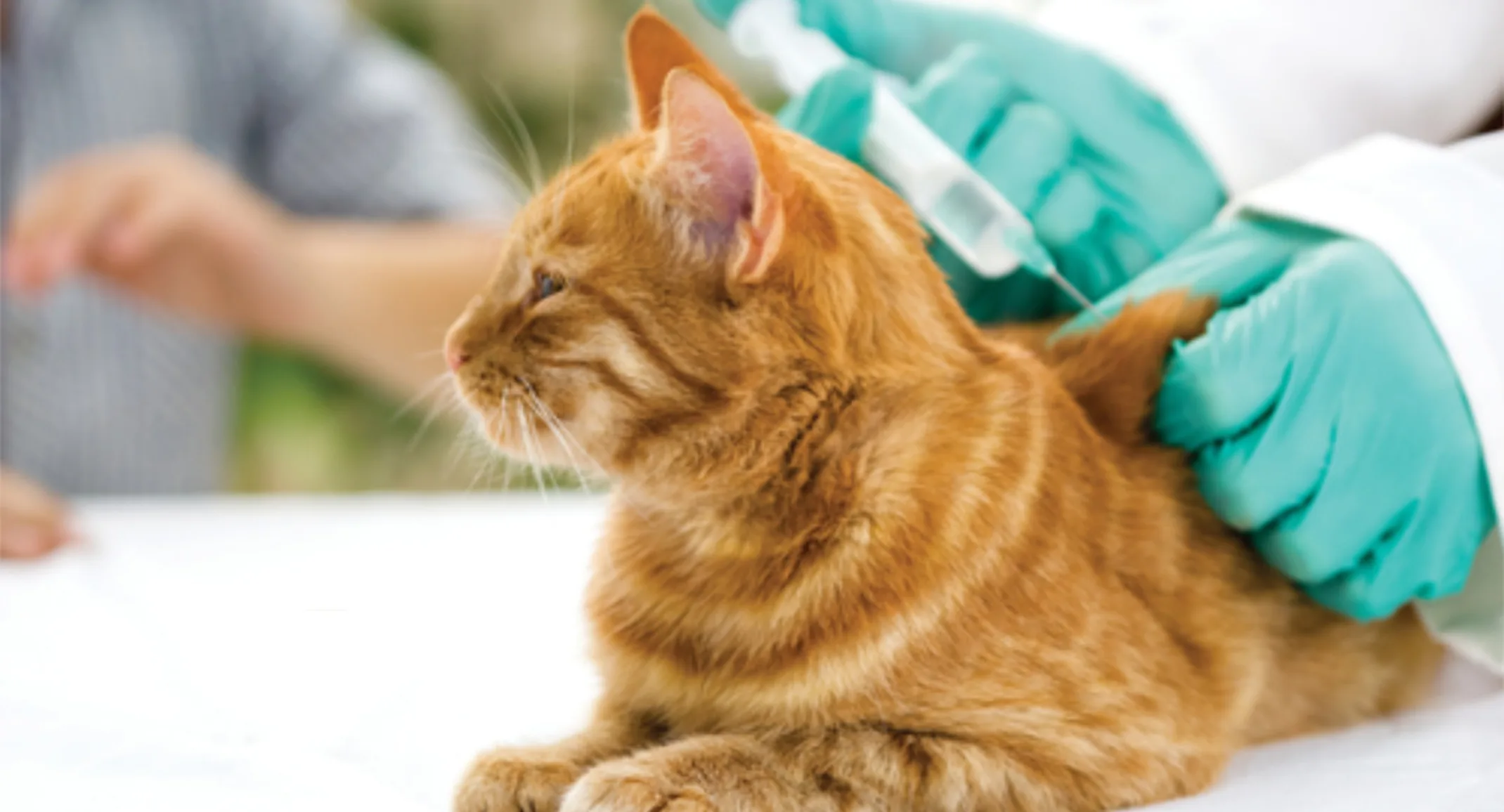Vaccine FAQs
General

Why do Pets Need Shots?
A newborn puppy or kitten does not yet have a fully developed immune system, and is prone to infection. A newborn animal is usually protected by its mother’s milk, which contains the antibodies in the mother’s body. After a few days the mother produces normal milk, and the newborns no longer accept external antibodies into their systems. The length that these antibodies last changes from individual to individual, however, by 14 to 20 weeks any remaining maternal antibodies are gone and the animal must begin to utilize their own immune system.
Vaccines given during a puppy or kitten’s maternal immunity period will remain “inactivated” until the maternal antibody is no longer present in effective numbers. As such, newborn animals receive a series of vaccinations at a time we are confident that the baby’s own immune system will be able to respond. To give puppies and kittens the best chance of responding to a vaccination we give them shots at regular intervals during their early lives to provide them with early protection against disease.
Any vaccine against a specific disease, even given to an older animal, will likely require two vaccinations. The second vaccination will produce a much more effective response if administered 2 to 4 weeks after the first.
Why do I have to Vaccinate my Pet Annually?
Vaccines are licensed by the USDA according to the minimum time they are expected to last. A vaccine licensed for annual use is found to be at least 80% protective a year after vaccination. Vaccines can be licensed for different time periods depending on the manufacturers testing process. As such, it is unclear as if these vaccines are effective for longer, as prolonged testing periods are expensive and often not performed.
Some, but not all, diseases can be prevented via vaccination. For a vaccine to build a long-lasting immunity, the infection must be generally present in the entire body rather than localized to an organ system. Vaccinations for specific organ systems and infections, such as kennel cough, require more frequent boosting as a result.
Read about the AAPA’s cat vaccination guidelines and the AAHA’s dog vaccination guidelines here:
What Should I Do if My Dog or Cat Skips a Year of Vaccinations?
Different vaccinations require different measures when restarting or resuming a vaccination.
Vaccines that do not require the series to be restarted if a year is skipped:
Feline Distemper
Feline Leukemia
Rabies
Kennel Cough (Oral Bordetella)
Vaccines that require the series to be restarted if a booster is skipped:
Canine Influenza
Canine Leptospirosis
Rattlesnake
Distemper
Parvovirus
If you have any questions about restarting or resuming vaccines, please contact our office so we can assist you.
What Vaccines Should I Get for My Pet?
The American Association of Feline Practitioners and the American Animal Hospital Association publish vaccination guidelines for both “core” and “non-core” vaccines. Every pet should receive “core vaccines” and depending on their exposure risk may receive “non-core” vaccines as well. Our facility will recommend and perform a full panel of vaccinations for your new puppy or kitten.
Recommended Vaccines for Cats:
Feline Distemper
Feline Herpes
Feline Calicivirus
Rabies
Feline Leukemia
Recommend Vaccines for Dogs:
Canine Distemper
Canine Parvovirus
Leptospirosis
Rabies
Kennel Cough
Canine Influenza
What is the difference between Live and Killed Vaccines?
The aim of a vaccine is to introduce a virus to a patient’s immune system to a virus so their body can react and build immunity to it without becoming ill. This can be done with either a “live” or “killed” vaccine.
A killed vaccine is when large amounts of the dead virus are administered to the patient to stimulate the body’s response to the vaccine. A dead virus will never return to virulence and will not cause the infection it aims to present. A live vaccine utilizes a version of the virus that has been modified so that it does not infect the animal.
Both types of vaccines are effective in general, but in some cases one type is preferred over the other. Our veterinary hospital will always utilize the most effective and safe form of the vaccine so you can rest easy knowing your pet is protected.
Why do Vaccinated Pets still get Sick?
It is possible for a pet to get sick from a disease that it has been vaccinated for. This occurs for a variety of reasons. Each pet’s immune system is different, so some pets may not react as well to a vaccine and build immunity in the same way as others might.
Some vaccines are not intended to provide full immunity, but instead to reduce the severity of symptoms should your pet be infected with the disease. An example of this is the feline upper respiratory infection vaccine.
In most instances a pet may get sick because of an incomplete vaccination. This can occur when a puppy or kitten does not finish its shots, or when an animal is exposed to the disease before all boosters are completed.
Can a Pregnant Pet Be Vaccinated?
Live vaccines can never be used in pregnant pets, as the live virus may not affect the mother but could be potent enough to impact unborn puppies or kittens. Killed vaccines may be administered during pregnancy, however, it is best to avoid giving medical treatments while a pet is pregnant. Killed vaccines may be administered to pregnant large and farm animals, it is not usually done for household pets.
What is a Recombinant Vaccine and is it Really Better Than Other Available Vaccine Types?
Recombinant Vaccines are vaccines produced by genetic engineering that are neither killed nor live. The only category of recombinant vaccines available to the general public is “vectored virus vaccines”. These are made by cloning the viral DNA responsible for stimulating a patient’s immune system. The now harmless cloned virus is given to the patient, and their body will recognize and react to the virus’ DNA without being exposed to the dangers of the virus. These types of vaccines provide the benefit of a live vaccine for diseases that are considered too dangerous to risk injecting live or modified virus into the patient.
Recombinant vaccines are currently used for Lyme disease, canine distemper, feline rabies, and feline leukemia. These vaccines cause less unnecessary stimulation to the immune system than killed virus vaccines, and there is no adjuvant present that may be harmful to your pet. Since the DNA of these vaccines is modified, there is no chance of them becoming virulent and causing an infection.
What Are Adjuvants?
Adjuvants are materials added to killed vaccines that help the body become immune to the virus. Upon injection of a killed vaccine, the body begins to break down and remove the new foreign substance. It is possible for this process to happen too quickly, meaning the body will not have enough time to create an immunological response to the virus. An adjuvant’s purpose is to keep the killed virus in the body for longer, so it has time to create a better immune response. Adjuvants are controversial in cats as they may be associated with tumor formation. As such, any vaccine we administer to a cat or kitten is free of adjuvants.
Why Do We Test for Feline Leukemia Before Vaccination?
It is possible for feline leukemia to be present in a “carrier” without causing any signs of illness. This can continue for years, during which the cat is both contagious and at risk. Vaccinating for feline leukemia in a cat that has already contracted the virus grants has no affect on the cat, its immune system, or the leukemia already within its system.
If a test for feline leukemia returns positive, the cat should be kept away from other felines as to not spread the disease. Additionally, an owner can prepare financially for expected leukemia treatments when the disease begins to affect a cat.
What is a Vaccine Titer?
A titer is used to determine if a vaccination is necessary for a pet. We can measure the levels of antibodies present in a blood sample; a titer refers to that antibody level within the animal. If a titer is high enough, a patient is protected against the infection in question and unnecessary vaccination can be prevented.
Can Vaccines Hurt My Pet?
Your pet may experience some symptoms such as swelling, lethargy, mild fever, or soreness for a day or two briefly following the vaccination. This is considered normal and is not dangerous to your pet. More severe reactions to the vaccine are possible but are unusual and happen very infrequently. Allergic reactions, such as facial swelling and hives, may occur and require additional medical attention. If your pet begins to vomit that may be a sign of impending shock. If either of these reactions occur please contact our hospital immediately.
Can Vaccines Cause Cancer?
There has been speculation that annual vaccination could be responsible for cancer, kidney disease, or other health issues. However, there is no evidence that annual vaccination increases the incidence or risk of health issues.

